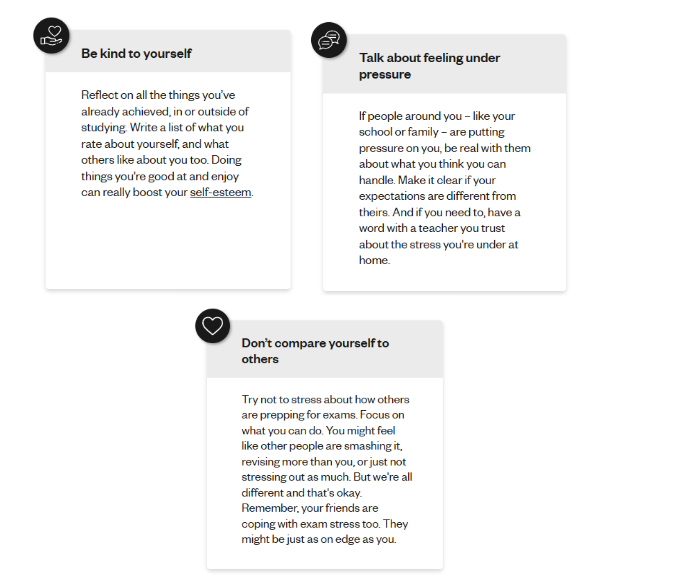Wellbeing - Supporting Young People with Exam Stress

Our Year 11 students have made a wonderful start to their exams, and they are getting into the routine of revision sessions, preparation and GCSEs.
I wanted to share with you some ways that you might support your child if they begin to feel the pressure at any point during the exam period.
It is normal to feel stressed about exams. Stress is a natural response to pressure that can actually be helpful. It can help us to focus and get things done, but sometimes it can get a bit too much.
A good analogy to help explain these feelings is the Stress Bucket and the link below will take you to a short video that may be useful to watch with your child.
The Stress Bucket
https://www.youtube.com/watch?v=1KYC5SsJjx8
Stress can build up into a low mood. Which can sometimes cause a cycle of events that some people find difficult to shake. Our thoughts affect our beliefs that impact our feelings and can influence our actions.
Challenging Negative thinking
When we find ourselves in a negative thought cycle, we may need help or reminding of how we can change these thoughts. One useful tool is the “catch it, check it and change it” response.
This useful video from Every Mind Matters helps to explain what the catch it, check it, change approach is.
https://www.youtube.com/watch?v=tfkhkFwCtxs
Coping with exam pressure
Whether you feel stressed before an exam, or it builds up over time, here are some things you can discuss with your child to ease the pressure:

Grounding techniques
Avoid last-minute cramming as this can be overwhelming. You’ve put the work and effort in and so you can spend some time focussing on being calm. Some people like to use relaxation or grounding techniques that can help dial down stress before an exam.
These include breathing exercises such as box breathing, where you visualise your breath work while mentally drawing a box in your mind or tracing it in the air with your finger.
Some people like to use the 5,4,3,2,1 method where you mentally look for the following.
There are also some great meditation apps and videos online that support positive visualisation.
Headspace is an online meditation tool and the following meditation may help to think about stress before an exam.
https://www.youtube.com/watch?v=P1-5Jt7vZzU
More videos can be found here: https://www.youtube.com/@headspace/search?query=exam%20stress
Making time for yourself
Make sure you find time to do something for yourself that helps you to wind down. This might be around self-care, going for a walk or run, going to the gym or enjoying a hobby or sport that you like to do.
Having some downtime helps the body and mind recharge. Finding the right balance between revision and relaxation is key.
Exercise - Exercise leads to higher levels of dopamine. This does not need to be high-intensity exercise. Just get out and get your body moving.
Nutrition - Improvements in nutrition have important benefits to your mood. High-sugar diets lead to inflammation in the body and higher levels of cortisol - the stress hormone.
Connection - Connecting with others, spending time with people, has a huge impact on our own self-talk. Positive relationships are key here to supporting our wellbeing.
Finally…Sleep
Sleep is so important! The body repairs and the brain processes information during sleep. Going to bed at a regular time and getting up at the same time each day is important. That means keeping to a routine during exam time is equally important. Encourage a time to wind down away from screens so that the body can relax and falling asleep is easier.
The following video has some great advice about sleep habits and getting into a good routine.
https://www.youtube.com/watch?v=t0kACis_dJE
We hope this information helps with your continued support throughout this final term.